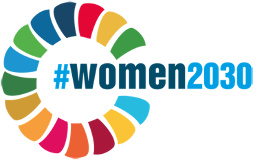About #Women2030
The Women 2030 Programme is being implemented in 50 countries across different regions of the world. It is constituted by a coalition of four women and gender network organisations cooperating to realize the Sustainable Development Goals (SDGs) in a gender-equitable and climate-just manner. The coalition has a 5-year framework partnership agreement with the European Commission.
On March 18, 2016, a coalition of four global and regional women and gender networks signed a 5-year partnership agreement with the European Commission to implement the Sustainable Development Goals (SDGs) of the global Agenda-2030. This coalition, known as #Women2030, supports the implementation of the Agenda 2030. With activities at international, regional, national, and grass-roots levels, the coalition integrates many of the SDGs in its work, with a particular focus is on Gender Equality (#SDG 5); Universal access to Water and Sanitation (#SDG6); Sustainable Energy (#SDG7); Decent Work (#SDG8); Sustainable Production and Consumption (#SDG12); Climate Action (#SDG13); Conserving Forests and Biodiversity (#SDG15).
Goal and aim
The Women 2030 programme’s aim is to advance local and regional, equitable, inclusive and environmental sustainable development processes. Our goal is to build capacity of women’s civil society organisations and engaging them in the policy processes of the 2030 Agenda and Paris climate Agreement. To achieve these goals, we currently facilitate participation in policy development and monitoring, mobilize citizens’ support, and sharing of best practices.
Three key areas
The three key areas of the programme are:
- capacity building: we are training members of civil society organisations (CSOs) to the challenges of the SDGs in order for them to share the lessons learnt with other CSOs at the national level. This will increase their capacity to monitor and implement the SDGs.
- strategic cooperation and policy advocacy: we are actively involved in international and national meetings and conferences, as well as being members of coalitions and constituencies that do advocacy in order to defend our demands and common interests on an international level.
- media and social outreach: we are sharing our actions via our website and on social networks (twitter, facebook…) and through the press. This way, we can get our voices heard on a broader level as well as regularly informing the public on what we do.
The women’s networks in this coalition have been part of the sustainable development process from the very beginning as part of the Women’s Major Group. It was created by UN Member States in 1992 as a key social constituency for sustainable development.
SDGs
The #Women2030 coalition furthermore supports the implementation of SDG 17 to “Strengthen the means of implementation and revitalize the global partnership for sustainable development” and recognizes that an “empowered civil society […] can contribute to more effective policies, equitable and sustainable development.” (EU Commission)
Agenda 2030
The 17 Sustainable Development Goals, adopted by the UN in September 2015, are a universal road map to achieve the historic pledge to end structural inequalities between countries; rich and poor; men and women by 2030. The SDGs are based on the understanding that the challenges we face, such as poverty, environmental destruction, inequality, over-consumption, corruption and conflict, are all interconnected and cannot be tackled alone. The goals are also universal in nature, and will require collaboration and co-operation by all governments and across all sectors if they are to be successful.
Gender equality and women’s rights are crucial pillars to achieving the Sustainable Development Goals. If you want to know more on this subject, please consult our section “About the SDGs”.
Gender equality and women’s rights are crucial pillars to achieving the Sustainable Development Goals


